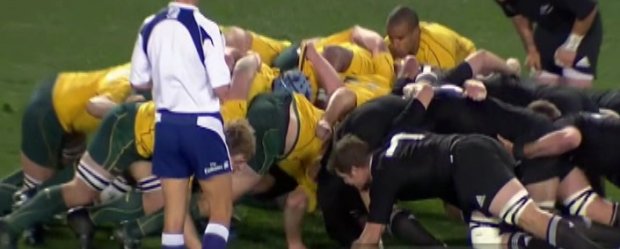Scheduled Website Maintenance
We’re currently in the process of moving to a new and improved server environment. During this transition, the website may experience brief interruptions or temporary outages.
We appreciate your patience while we complete this upgrade. Service will return to normal shortly, with improved performance and reliability.
Thank you for your understanding.
Whilst in any discussion involving rugby there is usually some talk of the strengths or weaknesses of certain teams’ scrum any such discussion inevitably gets back to the issue of scrum collapses and the need to repeatedly re-set scrums.
No matter which hemisphere someone hails from, no matter which team they support or which competition their team plays in you’ll struggle to find many people who are happy with the amount of game time taken up with scrums being re-set.
The IRB know it’s a major issue for fans and since 2009 have been gathering data to ascertain whether there’s been any improvement.
According to the IRB in 2009 and 2010 in Tier 1 International matches (involving Six Nations teams, Tr-Nations teams and Argentina) there were an average of 16 scrums awarded each game, of which an average of 9 collapsed per game or 56%.
At the conclusion of the 2011 Six Nations the IRB released data on scrum performance in that tournament that showed that for every 100 scrums packed in the Six Nations tournament 54 collapsed with 30 of those scrums being re-set and 44 resulting in a penalty or free kick so that the ball only came out of each 100 scrums on 56 occasions.
We’ve seen plenty of scrum collapses and re-sets in Southern hemisphere competitions but how do the numbers for Super Rugby and Tri-Nations Rugby in 2011 compare with the Northern hemisphere? We only have data on scrum re-sets but compared to the data from the IRB, there were fewer Southern hemisphere scrum re-sets than in the 2011 Six Nations tournament as follows:
| IRB Data - 2011 Six Nations | Verusco Data - 2011 Super Rugby | Verusco Data - 2011 Tri-Nations | |
|---|---|---|---|
| Average Number of Scrums Packed per game | 12 | 10 | 11 |
| Average Re-sets of Scrums per game | 4 | 2 | 3 |
| Re-sets per 100 Scrums Packed | 30% | 22% | 25% |
Given the different weather patterns in the Northern and Southern hemisphere winters you’d expect fields in the Northern hemisphere fields may be more slippery than in the Southern hemisphere and this may have some impact on the number of re-sets.
The IRB have publicly stated that they see the number of scrums collapses and re-sets as a major problem for the game. This is clearly not a problem just in the Southern hemisphere and there appears to be support from unions in both hemispheres to address the issues in 2012. The former England hooker, Brian Moore, is very critical of the current situation and sees it as a blight on the game.
Whether addressing the issue will involve applying the existing laws more strictly or a trial of new law variations remains to be seen but there is plenty of talk around that there may be a trial of laws involving a removal of the hit. That would remove one of the unique things about rugby and I’d prefer to see the hit retained but won’t be surprised if there is a trial implemented next year.
In Super Rugby in 2011 the number of scrums and scrum re-sets for each team was a follows:
| Team | Scrums With Feed | Scrum Resets on Own Feed | % Scrums Reset on Own Feed |
|---|---|---|---|
| Bulls | 134 | 18 | 13% |
| Chiefs | 151 | 21 | 14% |
| Sharks | 160 | 27 | 17% |
| Crusaders | 130 | 25 | 19% |
| Hurricanes | 140 | 27 | 19% |
| Highlanders | 176 | 35 | 20% |
| Brumbies | 169 | 34 | 20% |
| Blues | 133 | 27 | 20% |
| Cheetahs | 147 | 30 | 20% |
| Reds | 146 | 32 | 22% |
| Stormers | 155 | 36 | 23% |
| Lions | 142 | 33 | 23% |
| Waratahs | 202 | 51 | 25% |
| Force | 177 | 52 | 29% |
| Rebels | 227 | 67 | 30% |
In the 2011 Tri-Nations tournament the number of scrums and re-sets for each team was as follows:
| All Blacks | Wallabies | Springboks | |
|---|---|---|---|
| Average Number of Scrums Packed per game | 14 | 12 | 17 |
| Average Re-sets of Scrums per game | 2 | 3 | 5 |
| Re-sets per 100 Scrums Packed | 17% | 29% | 29% |
The Wallabies and Springboks re-set numbers in 2011 are similar to those of teams in the Six Nations tournament.
The Wallabies scrum has looked quite good this year but will face some testing times in the RWC starting with a strong Italian scrum this weekend. I doubt anyone expects the Wallaby scrum can dominate the strong scrummaging teams they’re likely to play in the tournament – Italy, Wales, England and New Zealand – but they don’t need to dominate at scrum time, just win their own ball and get it out quickly.

